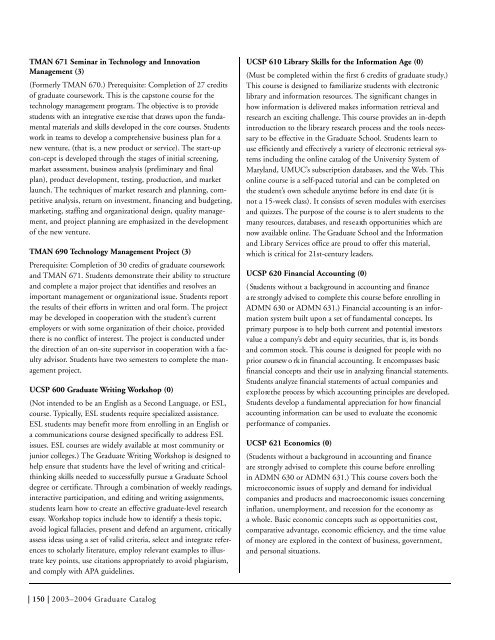A+B. Intro_SJ.1 - University of Maryland University College
A+B. Intro_SJ.1 - University of Maryland University College
A+B. Intro_SJ.1 - University of Maryland University College
You also want an ePaper? Increase the reach of your titles
YUMPU automatically turns print PDFs into web optimized ePapers that Google loves.
TMAN 671 Seminar in Technology and Innovation<br />
Management (3)<br />
(Formerly TMAN 670.) Prerequisite: Completion <strong>of</strong> 27 credits<br />
<strong>of</strong> graduate coursework. This is the capstone course for the<br />
technology management program. The objective is to provide<br />
students with an integrative exe rcise that draws upon the fundamental<br />
materials and skills developed in the core courses. St u d e n t s<br />
w o rk in teams to develop a comprehensive business plan for a<br />
new venture, (that is, a new product or service). The start-up<br />
con-cept is developed through the stages <strong>of</strong> initial screening,<br />
market assessment, business analysis (preliminary and final<br />
plan), product development, testing, production, and market<br />
launch. The techniques <strong>of</strong> market research and planning, competitive<br />
analysis, return on investment, financing and budgeting,<br />
marketing, staffing and organizational design, quality management,<br />
and project planning are emphasized in the development<br />
<strong>of</strong> the new venture.<br />
TMAN 690 Technology Management Project (3)<br />
Prerequisite: Completion <strong>of</strong> 30 credits <strong>of</strong> graduate coursework<br />
and TMAN 671. Students demonstrate their ability to structure<br />
and complete a major project that identifies and resolves an<br />
important management or organizational issue. Students report<br />
the results <strong>of</strong> their efforts in written and oral form. The project<br />
may be developed in cooperation with the student’s current<br />
employers or with some organization <strong>of</strong> their choice, provided<br />
there is no conflict <strong>of</strong> interest. The project is conducted under<br />
the direction <strong>of</strong> an on-site supervisor in cooperation with a faculty<br />
advisor. Students have two semesters to complete the management<br />
project.<br />
UCSP 600 Graduate Writing Workshop (0)<br />
(Not intended to be an English as a Second Language, or ESL,<br />
course. Typically, ESL students require specialized assistance.<br />
ESL students may benefit more from enrolling in an English or<br />
a communications course designed specifically to address ESL<br />
issues. ESL courses are widely available at most community or<br />
junior colleges.) The Graduate Writing Workshop is designed to<br />
help ensure that students have the level <strong>of</strong> writing and criticalthinking<br />
skills needed to successfully pursue a Graduate School<br />
degree or certificate. Through a combination <strong>of</strong> weekly readings,<br />
interactive participation, and editing and writing assignments,<br />
students learn how to create an effective graduate-level research<br />
essay. Workshop topics include how to identify a thesis topic,<br />
avoid logical fallacies, present and defend an argument, critically<br />
assess ideas using a set <strong>of</strong> valid criteria, select and integrate references<br />
to scholarly literature, employ relevant examples to illustrate<br />
key points, use citations appropriately to avoid plagiarism,<br />
and comply with APA guidelines.<br />
UCSP 610 Library Skills for the Information Age (0)<br />
(Must be completed within the first 6 credits <strong>of</strong> graduate study.)<br />
This course is designed to familiarize students with electronic<br />
library and information resources. The significant changes in<br />
how information is delivered makes information retrieval and<br />
research an exciting challenge. This course provides an in-depth<br />
introduction to the library research process and the tools necessary<br />
to be effective in the Graduate School. Students learn to<br />
use efficiently and effectively a variety <strong>of</strong> electronic retrieval systems<br />
including the online catalog <strong>of</strong> the <strong>University</strong> System <strong>of</strong><br />
<strong>Maryland</strong>, UMUC’s subscription databases, and the Web. This<br />
online course is a self-paced tutorial and can be completed on<br />
the student’s own schedule anytime before its end date (it is<br />
not a 15-week class). It consists <strong>of</strong> seven modules with exercises<br />
and quizzes. The purpose <strong>of</strong> the course is to alert students to the<br />
many re s o u rces, databases, and re s e a rch opportunities which are<br />
n ow available online. The Graduate School and the In f o r m a t i o n<br />
and Library Services <strong>of</strong>fice are proud to <strong>of</strong>fer this material,<br />
which is critical for 21st-century leaders.<br />
UCSP 620 Financial Accounting (0)<br />
( Students without a background in accounting and finance<br />
a re strongly advised to complete this course before enrolling in<br />
ADMN 630 or ADMN 631.) Financial accounting is an information<br />
system built upon a set <strong>of</strong> fundamental concepts. Its<br />
p r i m a ry purpose is to help both current and potential inve s t o r s<br />
value a company’s debt and equity securities, that is, its bonds<br />
and common stock. This course is designed for people with no<br />
prior coursew o rk in financial accounting. It encompasses basic<br />
financial concepts and their use in analyzing financial statements.<br />
Students analyze financial statements <strong>of</strong> actual companies and<br />
e x p l o re the process by which accounting principles are deve l o p e d .<br />
Students develop a fundamental appreciation for how financial<br />
accounting information can be used to evaluate the economic<br />
p e rformance <strong>of</strong> companies.<br />
UCSP 621 Economics (0)<br />
(Students without a background in accounting and finance<br />
are strongly advised to complete this course before enrolling<br />
in ADMN 630 or ADMN 631.) This course covers both the<br />
microeconomic issues <strong>of</strong> supply and demand for individual<br />
companies and products and macroeconomic issues concerning<br />
inflation, unemployment, and recession for the economy as<br />
a whole. Basic economic concepts such as opportunities cost,<br />
comparative advantage, economic efficiency, and the time value<br />
<strong>of</strong> money are explored in the context <strong>of</strong> business, government,<br />
and personal situations.<br />
| 150 | 2003–2004 Graduate Catalog

















